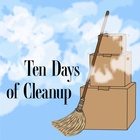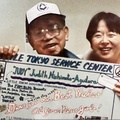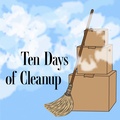“Hello, Souji RS. Hiroko speaking.”
I held my cell phone to my ear as I defrosted some natto in the microwave. My 10-year-old daughter Sycamore’s lunch break was in a few minutes and she had 50 minutes before her next Zoom session.
“Are you the cleaning service?” The voice on the other line was male, low without any warmth. He sounded American, which meant he could have been any race or ethnicity.
“Ah, I provide a soul cleansing and past erasing service.” That was the tagline that I had devised after taking a free online branding course.
No response from the caller.
“Yes, I’m the cleaning service.” I didn’t want to argue. I couldn’t afford to. It was May 2020, in the middle of the pandemic and sheltering in place. I was a single mother and money was getting tight. I already had placed myself in the essential services category by offering disinfection services. I only had one disinfection client—a boba shop whose teenage workers were constantly testing positive. I longed for my regular clients—going into people’s homes and garages, and disposing of unwanted junk.
“I have a storage unit on Arroyo Seco in Pasadena,” the caller said. “I need it emptied out by Memorial Day.”
“I can do that—”
“E-mail me your contract. I’ll text you my e-mail address. I can PayPal your deposit today.”
With that, the man ended the call. I realized that I didn’t get his name.
I created my business, Souji RS, before Marie Kondo’s book came to America.
Souji means “clean-up” in English and the RS—well, if anyone can accuse me of appropriation, it may be that toy chain with the giraffe spokesman. That company has gone through a bankruptcy and some spinoffs. I, a one-woman operation, on the other hand has kept going.
As I mentioned before, the pandemic had affected me. I tried to give cleaning tips on YouTube (press the subscribe button!) but I’m the first to admit that I don’t have the most telegenic personality. Even my grade school teachers in Japan said that I had problems relating to people. I didn’t want to ask Sycamore’s father for a loan. He had his own family now, a baby who had recently turned one. Luckily, Stewart was still a good father to Sycamore. That much I was thankful for.
My cell dinged with a text. The e-mail address was RS05312020@gmail.com. Was this some kind of joke?
I texted him back. Your name.
Ryan Stone.
A non-descript name. It sounded fake. If his PayPal deposit cleared, however, I frankly didn’t care.
I opened up my laptop to prepare my contract. “Mommy’s got a job,” I said to Sycamore, who had removed the natto from the microwave and was eating it with some hot rice from the rice cooker.
“Yippee. Does that mean Fosselman’s ice cream tonight?”
How could I refuse?
* * * * *
The e-mail from Ryan Stone was curt and to the point. He included the number of the storage unit and its passcode. My contract, with his changes and signature, was attached. I quickly signed and returned it. A few minutes later, I received an e-mail from my PayPal account that money from RS05312020@gmail.com had been received.
That night I tossed and turned in bed. I blamed it on not taking a Lactaid before having my rum raisin ice cream. But deep inside, I knew what was wrong. I shouldn’t have said yes to Ryan Stone.
Once Sycamore was on her Friday Zoom class, I crept outside to the car, my mask dangling around my wrist. Wearing a mask was not a big deal for me; I grew up with it in Japan, but I have to admit it was strange to see some Americans struggling with them. Their noses were often out of the mask. When they sneezed, they pulled down their mask, which totally defeated the purpose of the protective gear in the first place.
By the time I arrived at EZ Storage Units, my mask was properly on my face. I put on disposable gloves, too. I brought my kit of disinfecting solutions because who knows what state the storage unit was in.
I signed in with a masked worker who pushed a map through my window and directed me to the location of the unit. This was one of these places where a car could easily park in front of a unit for easy transfer of goods. I drove my used Chevy Silverado, which I had traveled to Las Vegas to purchase. Luckily, I was tall for a Japanese woman, 5'7", and had no problems getting into it or loading the wide bed.
There was a kiosk in front of the row of Ryan Stone’s unit. With my gloved finger, I pushed in the unit code and the passcode. The message on the screen was “UNLOCKED.”
I returned to the unit and pulled up the gate. My heart always fluttered before the reveal. What was behind the door? A fancy car? Stacks of designer handbags?
Instead I was met with a wall of items, all covered in plastic. There was not even room for me to step one foot into the unit.
“Oh my God,” I murmured to myself. Memorial Day was ten days away. The unit was even larger than the apartment that I’m renting. Due to COVID-19, none of the thrift stores were accepting donations. My only resort was to take tons of Ryan Stone’s trash to the dump. This didn’t make sense. The labor involved with taking multiple trips to the landfill as well as the cost per ton wouldn’t be worth what I will be paid in full.
Ryan Stone would be better off using one of those disposal companies that had giant dumpsters that could take care of this in one swoop.
I had a cancellation provision in my contract. I’d just let Ryan Stone know that I wasn’t the right service for him. I’d immediately return his deposit. Good riddance.
I texted him telling him about my decision. He immediately replied back:
You signed the contract. You don’t want to be in breach of it, do you?
What? I felt my throat closing up and it had nothing to do with the mask over my face. I frantically searched for the contract on my phone. I had failed to read it carefully before I signed his revised version. He had removed my cancellation provision. Instead, he replaced it with a mandate that I would owe him $5,000 if I didn’t complete the job.
In my rush to make money during the pandemic, I had now entered into an agreement that might be my undoing.
© 2020 Naomi Hirahara





